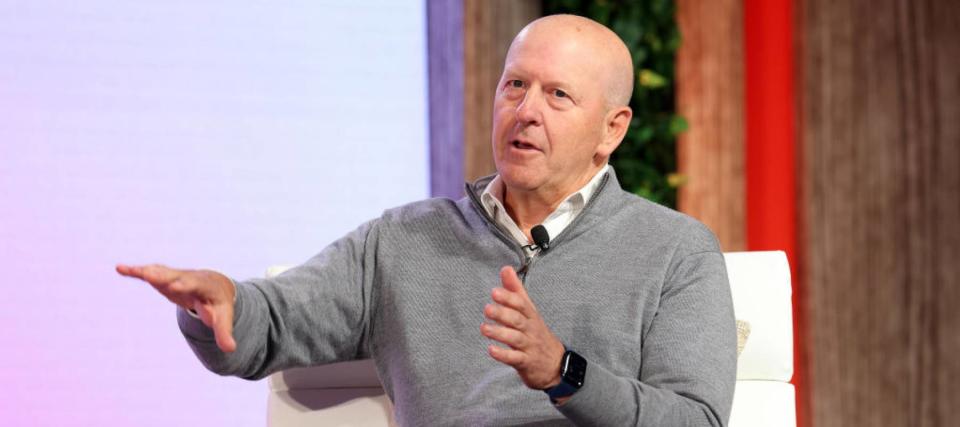‘The cost of that goes way up’: Goldman Sachs CEO slams proposal to force banks to hold billions more in capital — argues it'll be regular Americans left to shoulder the 'friction and cost'

The CEO of one of America’s largest banks has slammed a proposal he says could inadvertently harm Americans’ retirement savings.
David Solomon, the head honcho at Goldman Sachs (GS), has joined a chorus of banking execs criticizing U.S. bank regulators’ plan to require large banks to raise the capital on their books by 16% in order to guard against risks like bank insolvency.
Don’t miss
Commercial real estate has outperformed the S&P 500 over 25 years. Here's how to diversify your portfolio without the headache of being a landlord
Rich young Americans have lost confidence in the stock market — and are betting on these 3 assets instead. Get in now for strong long-term tailwinds
Save big on your holiday shopping with an app that’s already saved users $800 million
The ambitious reforms were proposed in July after the sudden collapse of three high-profile regional banks in the spring. But there’s been pushback from banking leaders ever since.
In a recent interview at the Financial Times banking conference in London, Solomon argued the proposed reforms won’t make the world’s financial system any safer. In fact, he warned the changes could actually make certain costs go “way up” for Americans.
“I don’t think you’re materially changing the safety and soundness in the way that matters compared to the friction and cost,” he said, per Bloomberg. Here’s why Solomon and other financial executives are concerned.
How would the changes impact you?
The additional 16% capital requirement proposed by a trio of regulators — the Federal Reserve, Federal Deposit Insurance Corp. (FDIC) and Office of the Comptroller of the Currency — could force banks to trim services, raise fees or both, according to Solomon.
Speaking at the Financial Times banking conference in London — just days ahead of the Nov. 30 deadline to comment on the proposed rules — the Goldman exec said: “I don’t think you’re materially changing the safety and soundness in the way that matters compared to the friction and cost.”
Solomon worries that mandating banks to keep a higher percentage of assets liquid will impact pension managers’ abilities to lend out their securities.
Securities lending is a common source of extra income for pension funds. By lending out their securities, funds can earn fees and potentially grow their investment returns — which is a boon for retirement savers. If banks can’t participate in as much securities lending — due to the regulatory requirement to hold more liquid assets, like cash — pension funds could suffer a drop in returns.
With more limitations on how they invest and make money, banks may also have to increase their costs to lend money or provide other services to consumers.
“You have to do a really thorough cost-benefit analysis,” said Solomon. “I don’t think that’s been done.”
While the new rules, if approved, wouldn’t come into effect until mid-2028, for any Americans who worry how this might affect their retirement savings, now’s the time to get your finances ready. Here are a few ways to set your finances up to ride out whatever the future brings.
Read more: Thanks to Jeff Bezos, you can now use $100 to cash in on prime real estate — without the headache of being a landlord. Here's how
Bolster your retirement security
If you’re worried about cash flow in retirement, the last thing you want to do is start this new stage with a mountain of debt. Your nest egg is meant to help you live out your golden years in comfort and security; not pay down the debts you accrued in your working life.
If you’ve got several sources of expensive debt and multiple lines of credit to take care of, you could try negotiating with your lender for better terms and conditions, or consider a debt consolidation plan that keeps you on track and with a lower interest rate.
If you’re more worried about the longevity of the U.S. banking system and the health of your retirement savings, consider finding ways to diversify your portfolio away from traditional cash, stocks and bonds.
Some popular alternative investments include: real estate (through buying shares in REITs or crowdfunding platforms), precious metals, like gold; and collectible items, like art and wine. This may seem counterintuitive when saving for retirement, but these assets typically appreciate over time and are considered a good hedge against inflation.
What to read next
Worried about the economy? Here are the best shock-proof assets for your portfolio. (They’re all outside of the stock market.)
Here's how much the typical baby boomer has saved for retirement — how do you stack up right now?
'A natural way to diversify': Janet Yellen now says Americans should expect a decline in the USD as the world's reserve currency — 3 ways you can prepare
This article provides information only and should not be construed as advice. It is provided without warranty of any kind.

 Yahoo Finance
Yahoo Finance 